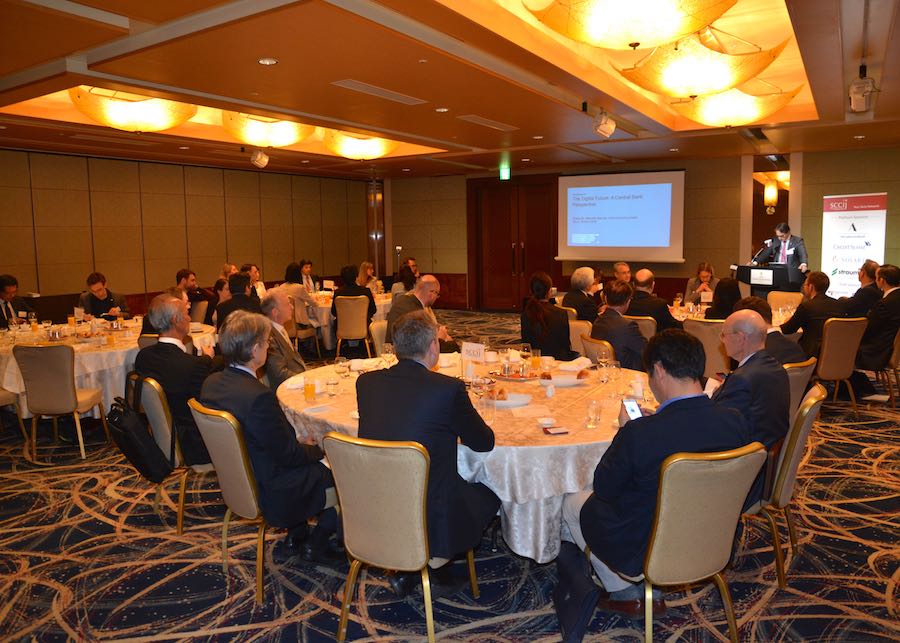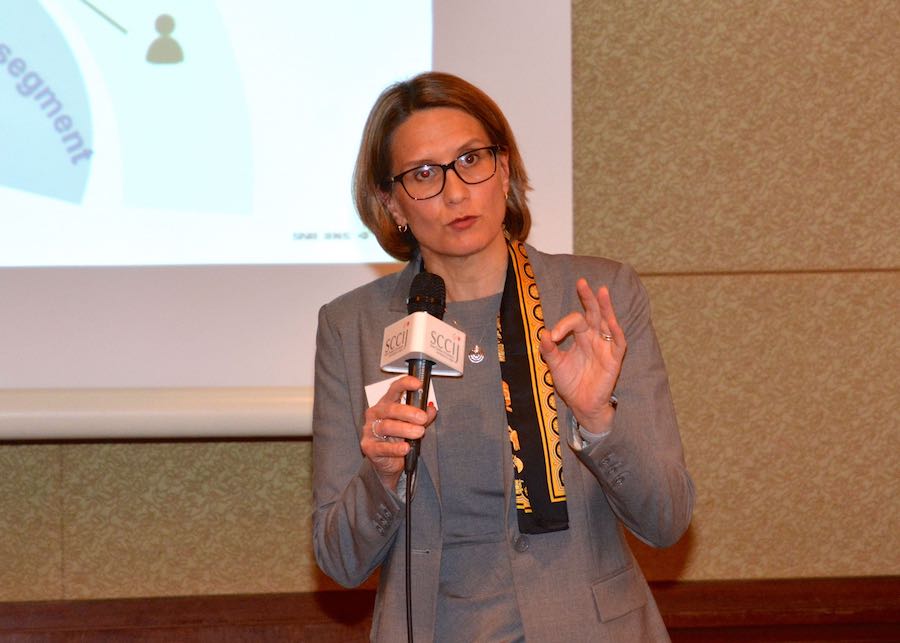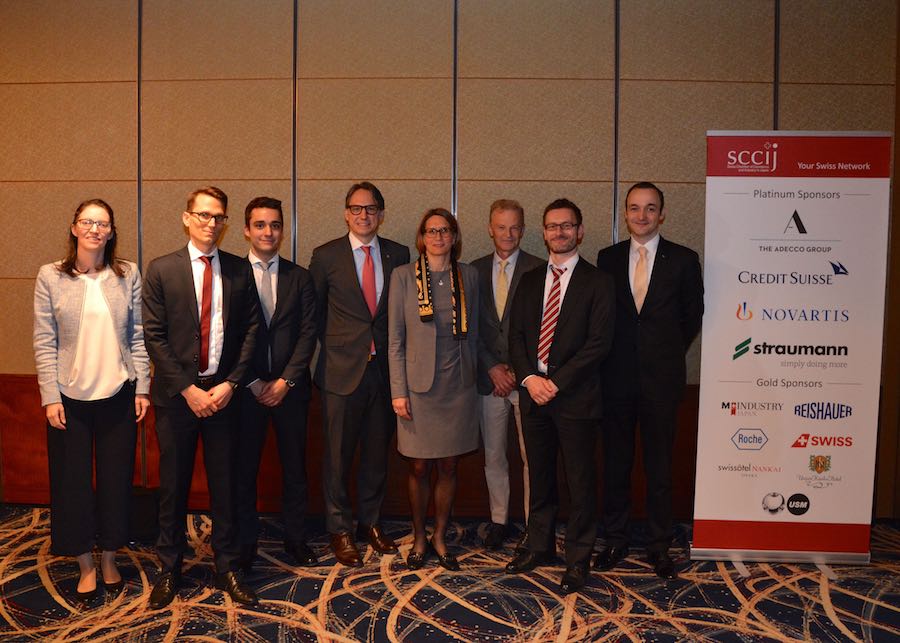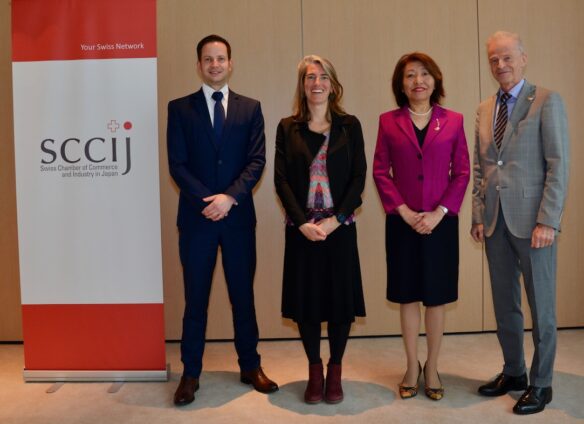Tokyo (SCCIJ) – In a lecture for the about 40 SCCIJ members and guests of the April Luncheon, Dr. Andréa M. Maechler, the first and currently only female member of the Swiss National Bank’s (SNB) governing board and in charge of financial markets, banking operations and information technology, has carefully examined the purposes and benefits of recent innovations in the financial markets. She mainly focused on the blockchain as the digital technology behind the creation of cryptocurrencies, but also analyzed some other new fintech applications. Her lecture was followed by a lively discussion about the future of cross-border payments and cyber money.
Rise of digital currencies
“Fintech, DLT and cryptocurrencies are currently attracting a great deal of attention among the general public and in the financial industry”, the SCCIJ luncheon speaker started her talk. Although alternative private currencies were nothing new, in the modern digital era they could be created more or less at the click of a mouse. However, that alone would not make cryptocurrencies comparable with money – far from it, she emphasized.

SCCIJ April Luncheon
According to the SNB board member, it would be important to draw a distinction between cryptocurrencies as an investment instrument and the underlying technology. The distributed ledger technology, or DLT for short, on which these currencies are based does indeed have potential in various areas of the economy, she added. DLT would be regarded as one of the biggest innovations in the fintech area.

SCCIJ April Luncheon speaker Dr. Andréa M. Maechler
Distributed ledger technology
DLT could also affect an important part of the financial system, namely the financial market infrastructure. Since facilitating and securing the operation of cashless payment systems is one of the SNB’s statutory tasks, and also because it depends on a secure financial market infrastructure, the SNB monitors developments in this area very closely.
“The SNB welcomes innovations that enhance efficiency, but this must not be taken as the only criterion”, the speaker described the position of the SNB. “As a central bank, the SNB is obliged to keep a close eye on the risks involved, too.” This would apply especially to those parts of the infrastructure that are systemically important for Switzerland. Here the SNB sets the highest of standards when it comes to security, she added.
Minimizing systemic risks
Dr. Maechler continued: “To minimize risks in systemically important areas, there still needs to be a risk-free payment instrument.” This would be the reason why time-critical, large-value payments are now usually settled through central banks’ payment systems and in central bank money. Central banks thereby ensure that the infrastructure provides a reliable foundation.
“It is currently too early to say whether DLT will in future be put to use in this domain, too”, she insisted. Should DLT take hold in securities settlement, the question would then arise as to how DLT-based securities systems and conventional central bank payment systems can coexist.
In her opinion, however, which technologies and solutions ultimately prevail on this solid foundation should in principle be left to the market to decide. This division of roles between central banks and commercial banks would epitomize our current two-tier financial system. It also would contribute to the stability of the system, while allowing sufficient leeway for innovation.

SCCIJ executive committee members and advisors with April Luncheon speaker Dr. Andréa M. Maechler
Fintech and financial system
However, there is more to fintech than just DLT, she said. To satisfy constantly evolving customer demands, fintech companies and banks alike are working on new solutions. One of the key focal points for fintech is retail payments. The SNB will keep a close watch on developments to ensure that it always remains able to assess their potential impact on the financial system in good time, she said.
A more prominent role for central banks in this end-customer business area is currently a subject of debate, amid calls for ‘digital central bank money for the general public’. “The SNB opposes this idea”, Dr. Maechler clarified. Digital central bank money for the general public would not necessary ensure an efficient system for cashless payments. It would deliver few advantages, but would give rise to incalculable risks with regard to financial stability, she said.
Her speech in Tokyo was based on an earlier speech of hers in Zurich. Its full text, including the slides the speaker also used in Tokyo, can be viewed here.
About the speaker
Dr. Andréa M. Maechler was born in Geneva in 1969. She studied economics at the University of Toronto, and then at the Graduate Institute of International Studies in Geneva, where she obtained her Master’s in International Economics. Following a period of study at the Institute of Advanced Studies in Public Administration in Lausanne, she obtained her PhD in International Economics from the University of California, Santa Cruz in 2000.
Dr. Maechler’s early career took her to the Organisation for Economic Co-operation and Development (OECD), the United Nations Conference on Trade and Development (UNCTAD) and the World Trade Organization (WTO). From 1999 to 2001, she worked as an economist in the Swiss National Bank’s (SNB) Financial Stability unit in Zurich. She then moved to the International Monetary Fund (IMF), where she occupied a number of senior positions in the Africa, Monetary and Capital Markets, Western Hemisphere and Strategy, Policy and Review departments.
From 2012 to 2014, during a sabbatical from the IMF, she worked for the European Systemic Risk Board (ESRB) in Frankfurt. Upon returning to the IMF, she was appointed as Deputy Division Chief in the Global Markets Analysis Division. The functions of this division include monitoring global capital markets, and assessing systemic risks and the macrofinancial impact of capital market developments. With effect from 1 July 2015, the Federal Council appointed Dr. Maechler as Member of the SNB’s Governing Board – the first woman to occupy a Board position. At the same time, she became Head of Department III (Financial Markets, Banking Operations and Information Technology).
Text: Martin Fritz based on SNB material; Photos: Martin Fritz for SCCIJ





























